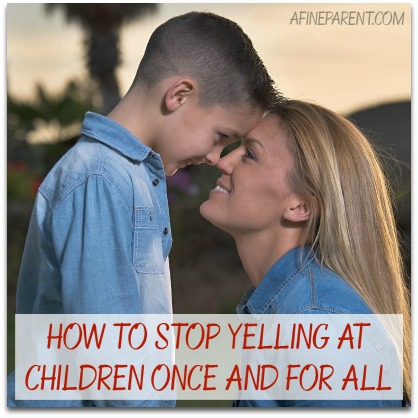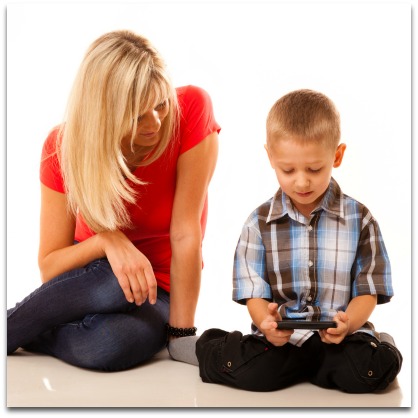 You are doing it again!
You are doing it again!
Yelling at your children over big things, little things, and all things in between.
But why?
Why do we parents feel the need to yell when our point isn’t getting across?
Why do we have to resort to screaming to get our kids’ attention?
The reality is—we don’t have to. We are making rash decisions in difficult moments that are teaching our children bad habits.
Janet Lehman, a veteran social worker who she specializes in child behavior issues says:
“When chronic screaming becomes the norm, children are also apt to think it’s okay for them to scream all the time, too. You’re teaching your kids that screaming is a suitable response when you’re frustrated or overwhelmed. It doesn’t teach anything positive, just that life is out of control—and emotionally, you’re out of control.”
Wow—that hit home!
Believe me, I am not judging.
I was (probably) the world’s worst about yelling when my kids did something wrong, wouldn’t listen, talk back, seemed defiant — the list could go on and on.
I was a chronic yeller.
But I had a terrible wakeup call when I ended up in the middle of a feud that happened in my extended family. Though this person was totally out of line when making accusatory statements, one thing that was said to me was, “Well you’re a horrible mother because I’ve heard you yell a lot!”
Ouch!
What could I say? “No, I’m not a horrible mother! I am just human”? But I did yell a lot!
That hit me right between the eyes, and I woke up. I decided from that day forward I was going to work on not yelling.
I was going to conquer this horrible habit I had developed.
Not because this person was wrongfully judging me, and I didn’t want it to happen again. (I mean, no one wants that, but you can’t please everyone either.)
But because I was and am a good mom, and I want a better relationship with my children than that!
 I want to have enough self-control that when things get tough in parenting, I can communicate with my kids and not just bark demands.
I want to have enough self-control that when things get tough in parenting, I can communicate with my kids and not just bark demands.
So, if you are in the same boat as I was, I want to share with you a few tips I used to stop yelling at my kids once and for all.
#1 Know What Sets You Off And Nip It
 We all have pet peeves. We are human after all.
We all have pet peeves. We are human after all.
There are certain things that happen throughout a day that just grind your gears.
Inevitably, the ones we love most are going to find a few of those gears and start grinding away at them.
You need to start realizing what those things are.
The reason is because those ‘gears’ are what is going to trigger you losing your cool and raising your voice.
I am an efficient person, and I have a lot going on throughout my day.
I homeschool all three of my children; I’m graduating college in the next two months; we operate a small farm; and I work part-time from home.
So, when I ask my children to do something to help me, and they drag their feet, that is a ‘gear’ of mine that they are grinding.
How do you beat that, though?
The first step is to recognize it as a trigger. Realize that in those instances where your kids don’t move quite as fast as you’d like that you are susceptible to yelling.
If you pay close attention in those instances and realize that those are weak moments for you, then you are more likely to focus on not yelling verses the issue at hand. (Which for me would be my children moving slower than molasses.)
One great option that has worked for me has been to develop a mantra. Parents.com has wonderful advice that suggests we “pick out a word or phrase that will distract you from yelling and that will remind you that your child isn’t trying to drive you nuts — they are just being kids.” They suggest the phrase, “He’s only one — he’s only one.” They say repeat it multiple times when you feel as though you are about to explode in a verbal manner.
I found that this is extremely helpful. My personal mantra is “Calmer makes me stronger.”
#2 When You Feel Like Yelling, Take It Down A Notch (Or Twelve)
 When you are in those ‘trigger’ moments it is very easy to just raise your voice.
When you are in those ‘trigger’ moments it is very easy to just raise your voice.
Maybe your kids aren’t doing what you asked them to as quickly as you’d like.
Maybe you are having a discussion with your teenager (or two-year-old), and they are not budging.
Whatever your trigger might be, they’ve found it, and your gears are grinding so badly you can hear the sound in your head.
What do you do?
Whisper.
I have found this works wonders.
Not only do you not yell, but you also gain your children’s attention.
Our middle son marches to his own drum, and I love it in most instances. But in those moments where I need him to do something, and he moves at a leisurely pace, those are the moments when I want to yell.
I really do, but I’ve realized that just makes him move slower. He simply tunes me out and continue to march to his own beat.
The first time I consciously refused to yell at him, and I went to him, made eye contact and whispered, “I really need you to unload the dishwasher for me, so the kitchen won’t be such a mess. It will really help me feel better about the house. Can you do that for me?”
It startled him into action!
Our kids get so accustomed to our yells that they become numb to it. It doesn’t faze them.
However, when we go to them in a calm fashion and speak to them with dignity, it sparks something within them, usually, and they move.
I was startled the first time I turned my yell into a whisper… because it actually worked.
Deny that human aspect of you that wants to scream in those gear grinding moments and do the opposite. You may surprise yourself… and those around you.
#3 Two Words: Mommy Timeout
 We talked about triggers in step one. The second step is to overcome them.
We talked about triggers in step one. The second step is to overcome them.
When whispering doesn’t work, put yourself in a time out.
If you recognize you are in a trigger moment and simply recognizing its existence isn’t enough to cool you down, you’ve played that mantra over and over in your head, and steam is getting ready to fly out of your ears like a tea kettle and whispering is just not an option… put yourself in a time out.
It is better to walk away in those moments than to say something you’ll regret, or even worse, yelling it!
If you have a child that is in the infant/toddler stage, it is okay to put them in a safe place like a playpen or a crib and go to your room for a moment and breathe.
If you have older children, it is okay to literally say, “I’m getting too heated. I need a moment. Go play while I cool down.”
Willow, one of our A Fine Parent community members, has a brilliant trick: she tells her 6-year-old that she is getting triggered and goes to lie in a bed to calm down. How cool is that? Not only do you get to calm down, but your busy day has some built-in breaks where you get to lie down! I wish I had thought of this when our kids were younger.
Last night with our teenager though, I ended up with a lot of “tea breaks” instead. Here’s how it went –
We have a strict rule in our house about no long-distance dating relationships.
He is almost 17 and is starting to flex his teenage muscles. Teenagers have so much technology that they can talk to someone across the globe in about 2 seconds.
He meets and talks to people through apps all of the time. We warn him constantly about the dangers of the internet, and we try to restrict but it is hard as parents in this technological age to safe guard our kids from every little thing that is out there.
At some point, you have to trust them.
So, we have been trying to, and I found out he was talking to a girl in a different state and getting a little too intrigued with the situation.
His dad and I had to sit him down and go over our rules for what felt like the millionth time. We had to cover all of the dangers. So on and so forth.
And though he knows our rules, he still tried his best to argue his way out of it.
I had a few moments that I really wanted to yell.
Those were also the moments that my glass of sweet tea would suddenly need to be refilled, and I would have to take a break.
I needed those time outs because arguing with a 17-year-old about his love life is a trigger situation for most parents.
When you are in the thick of a disagreement with your child or in a trigger moment that is escalating quickly, don’t be afraid to call a time out…. for yourself!
#4 Work Out A Deal With Your Kids
 I have found one of the best ways to stop my yelling is to give out consequences to my children and myself.
I have found one of the best ways to stop my yelling is to give out consequences to my children and myself.
When my children deliberately disobey me, they have to learn that is not how you treat other people.
So, we have an understanding. My kids love their electronics, but they are a privilege not necessarily a right.
The same way, as parents, we have to work for our privileges they have to work for theirs.
If our boys listen really well all day, then they earn their electronics time. If it is a day that mom feels like she’s going to pull her hair out then they don’t earn that privilege.
This was their idea, and it has cut down on the yelling in our house a lot.
Not just by me but by the kids also.
They have started paying more attention to how they treat each other which is great!
If your yelling is a direct reflection of feeling like you are not being heard in your home, then sit down with your children. Tell them how you feel.
Try to reach an agreement together of a consequence that they agree is fair for when they don’t listen.
Listening is a huge key to having a peaceful household and a good relationship with anyone. So don’t feel bad for telling your kids it hurts your feelings when you feel like they don’t hear you.
For my part, when I begin to yell, I don’t stop at just apologizing to my children but do an activity with them to try and bring unity back to a situation that my yelling tried to tear down.
It can be anything from baking a special snack to taking a trip to the park.
This is a good relationship builder for us and a good lesson on apologizing for them. It also helps keep me humble as a parent and to remind myself that just because I wear the name “Mom” does not mean that I’m a parental genius that never makes a mistake.
#5 Take Time To Reflect
 When it was so abruptly brought to my attention that I was a ‘yeller’ I realized then that I didn’t realize up until that point how much I was yelling.
When it was so abruptly brought to my attention that I was a ‘yeller’ I realized then that I didn’t realize up until that point how much I was yelling.
I had no idea what I was doing to my kids or family.
I just knew I was stressed all of the time.
I had, without quite my knowledge turned into a ‘chronic screamer.’ According to Janet Lehman,
“If you find yourself yelling at your kids much of the time, understand that it empowers your kids in a bad way, because it gives the message that you are not in control. […] It is important to realize kids feel unsafe when their parents have no control.”
When I finally stopped and thought about my yelling, I realized it was because of how insecure I was as a mother.
I was stressing myself out.
Two of my three children are not my kids biologically and that scared me to death.
I was so afraid of judgment. I was afraid people were going to look at me and say, “You are failing.”
Until it finally happened.
Then I began to realize that I’m giving my kids all I have. They are not going to be perfect all of the time. I am not going to be perfect all of the time.
And anyone that judges us by our imperfections verses our effort is the one with the problem.
So why was I letting that insecurity of being judged by other insecure people dictate my parenting style?
It was like an epiphany.
I stopped from that moment on.
I will not say I do not still have moments of insecurity. I do, but I quickly remind myself that my success as a parent is not based upon how smart my kids appear by a test or a GPA; how my kids behave on their hard days; or how many ‘time outs’ I have to give myself a day.
I am a good mom because I love my kids, and I give them everything I have. Period.
But the one thing I will try my hardest to no longer give them is my loud voice.
So, take time for yourself and figure out what is the driving force to those triggers. If your kids aren’t ‘Johnny on the spot’ when you call them, why does that upset you?
If your kids argue with your rules, why does that grind your gears?
It usually is based around a hidden fear we carry. Figure out what that fear is and put it to rest. If you are focusing on building a positive relationship with your child every day (even on the hard days filled with many imperfections from both sides) then you are giving it all you have and that is what matters!
The 2-Minute Action Plan for Fine Parents
For a quick moment of reflection, let’s look at how the yelling happens in our homes…
- Do you recognize your triggers when they are starting to surface? If so, do you give yourself a brief break to collect your thoughts?
- Do you try controlling your tone when you feel like yelling (e.g., say try whispering instead)?
- Do your kids understand how you feel in those moments when you raise your voice? Or do they just feel like you are flipping your lid again and completely block you out?
- Do you understand why you yell and how you can stop it?
The Ongoing Action Plan for Fine Parents
Over the next week, I’d say you’ll run into a time when you’ll want to yell. Pay attention to those moments.
Figure out what your triggers are and write them down. It helps to be able to physically look at things sometimes. Examine them and figure out if there is a way you can change the routine in your home to avoid them.
Talk to your kids about how you are feeling. Kids are very smart and caring. They might surprise you with the solutions they come up with.
Finally, take the time to reflect. Figure out what your driving force behind yelling is and toss it.
Most importantly, if you slip up and yell, don’t give up! Yelling is a habit. It takes a lot of control and effort to overcome it. Just keep trying and eventually you will realize that your moments of yelling will become fewer. You are still human, and you will still become frustrated. Learning how to handle our frustration in a different way is the key to kicking yelling out of relationships for good!

This was great! For me, I broke it down into 3 main actions.
1. the mantra ( I am going to steal yours – and say”Calmer=Stronger”
2. Whisper
3. Timeout for Mom
I have tried 2 and 3 and know that they work. I am going to add the mantra which will remind me to implement 2 and 3.
Hi Lisa!
I’m so glad you found this article helpful!
Hey Jennifer. I’m a yeller too. Thanks for this article. I needed it. Blessings to you as a mother and wife.
Hey Robin!
Yelling often times just happens without us even thinking, doesn’t it? It has been a long road of training myself to deny my ‘knee-jerk’ reaction to raise my voice when trigger situations happen and instead remain calm and communicate effectively.
I’m so glad it encouraged you! And thank you for your kinds words!
Great article Jennifer! I’m not a mother (I am a dog mom) but I still learned a lot from this article dealing with people in general. Anyone that may have told you in the past you were a bad mother is way out of line. I know this for a fact! I look forward to reading more of your writings!
Thanks Carole! I will pass your kind words on to Jennifer (both she and I are on a summer schedule with a commitment to spend less time on the Internet and more time with kids 🙂 ).
I totally agree with you that the other person was out of line in calling Jennifer a bad mother. That said, stuff like this sometimes happens and it’s completely out of our hands… the only thing we can control is how we handle it. And I personally think that the way Jennifer handled it — ie use it as a trigger for a massive change in her life — is nothing short of amazing!
Thank you so much. Beautiful article. I yelled at times. Not usually. But my daughter remembers those times and she was scared. I wish I had these articles when she was younger or when I was with her older brothers when they were little.
It has left a mark in her, unfortunatelly. She is 14 and treats me badly . Then she apologizes. She prefers to live with her dad. I’m so sorry. All 3 have turned up so well, but…with her it’s very difficult., Claudia
Hi, Claudia. We’ve all done things we are not proud of. What matters is where we go from now. I am sorry to hear that your relationship with your daughter is a bit frayed, but it is still not late. At 14 she is still very young. It’s easier said than done, but please leave guilt behind and focus on rebuilding the bridge… no matter what your daughter says on the outside, inside her is a little girl who really wants to be close to her mommy. Good luck to you… I hope you will share your turnaround story with us some day!
Great piece. I used to have a problem with yelling particularly when my husband was deployed and I was sleep deprived and stressed beyond reason. It always frustrated me when I yelled because I thought it said more about me than it did about the kids. But I always told them (and still do now although the yelling is rare anymore) that when parents yell it’s usually because they are scared or their feelings are hurt.
I like all of the advice in this piece, but I will say that the Time Out never worked for me. I think it may be related to the repeated deployment situation, but whenever I was upset and tried to go to a different room to calm myself down my children would always panic. They would follow me and pound on the door and weep which just made things worse for all of us. So for children with abandonment fears that one might not be a possibility–but for anyone who can make it work it always sounded like a good idea.
Thanks Korinthia. Everyday life seems stressful enough at times… I can’t even imagine what deployment must have been like. I you came out of it with just a few yelling episodes, I think you did better than fine!
To me yelling was the default setting… I don’t know if it is because of the way I was raised, or my personality, my daughter’s strong-willed nature… I’ve not been all that successful at not yelling at all, but we’re doing really well at not letting things escalate. So even now, after ~4 years of consciously trying, I still snap at her (more often than I like) but it is usually immediately followed by a deep breath and then a calmer discussion. I will take that as progress.
Our version of Mommy Time Out really works for us… it’s more of a Quiet Time than a Time Out… when things start to heat up, either me or sometimes her, says out loud that we need to stay shush for a few minutes to calm down. And those few seconds/minutes of quiet time are usually all we need to curb the instinctive, knee-jerk, snappy response and replace it with something more reasonable. Whatever works, right?
Totally. I wish so much a Mommy Time Out had been an option for me, but glad it helps you.
The thing that got me about the yelling when I did it daily for a while was that I knew I would have the self-control not to yell at someone else’s kid. So why was I yelling at my own? Eventually I realized my kids were training me to do it because it was the only thing that got an immediate response. And I only have ever yelled at my oldest, because she pushes me into it. It makes my other two move slower rather than faster, so it’s counter-productive, so I never do it. But I asked my oldest once, “Am I going to have to yell for you do get this done?” and she said, “Yes.” I told her that was mean to make me do that, and I wasn’t going to indulge her. Guh.
Anyway, every time you mention your daughter’s strong-willed nature I wish I could meet her. She sounds like an interesting person.
“Interesting” is one way to put it… I think she’s a bit like your Mona, with a little more snappier attitude that is a by-product of her environment/upbringing 😉
BTW, yesterday I was at my daughter’s art class. Normally I wait in the car and fiddle with my phone, but with summer around, I’m a little behind on work. So I took my laptop to their waiting area and decided to catch up. From behind the half wall, I could hear a very precocious child in what must have been a private lesson… OMG! After listening to him question everything the teacher suggested and try to add his own twist to everything and just push limits non-stop for the entire hour, I’m convinced I have it easy. He wasn’t doing it to spite the teacher or out of malice. And I could tell from his questions that he was definitely in the above-average-possibly-genius category. But it was relentless. I have such huge respect for that art teacher for staying so patient throughout that class. And I sent a silent prayer for the kid’s parents (for real, even though I’m not a praying person!) And then I thought of you… Him, I think you would have LOVED to meet 🙂
Ha! I’m always impressed with the patience of my kids’ violin teacher, and when I complimented her she just smiled and said, “I only have to deal with each person’s kid for a half an hour! I’m not sure how parents do it.” Other people’s kids always seem more annoying than our own. That may be where biology kicks in, or we’d be doomed as a species.
Thank you. I’m a yeller no doubt. My mom never ever yelled and I really wonder how she did it but I guess it happens when you just have no control over your emotions. I’m going to try it out.
Reader, I think personality plays a big role in this as well. Both my daughter and I are strong willed people and we react before we think, and our response just happens to be big, loud and snappy. Maybe it is just your personality that is different from that of your mom? Either way, emotional control/mastery — NOT suppression, but allowing it to flow without causing devastation — is really hard but totally worth striving for! Wish you the very best!
Great article. I really hope to apply these techniques and see the benefits. I am tried of yelling and kids just ignoring it- mad house.
Thanks for your kind words, Namrita! And good luck with the Mad-House-No-More project 🙂 Here’s to less yelling, more getting-things-done!
When I think I’m going to yell, I leave the child alone, go to my room, close it (a message to my brain, divert) and start reading something I like. My mind immediately ventures on new ground. The kids get the message too and I see peace in the house. The action that displeased me is never repeated. Another helpful technique is breathing. To release stress breathe in deep, exhale very slowly in double the time. Repeat this 8-10 times. A calmer version of you will surface immediately. Or inhale thee short breaths and then exhale one long slow breath. Repeat 8-10 times. Breathing prepares you to handle the problem with sanity and peace.
Thanks for sharing the wonderful tips, Pratisha — particularly the breathing techniques. I’ve experimented on and off with watching my breath, but more in the context of meditation… it’s still on my “Things I’m Not Good at Yet, But Would Like to Master Some Day” list. Your comment is yet more motivation to keep trying 🙂
Thank you for this very informative piece. Definitely going to implement it:-)